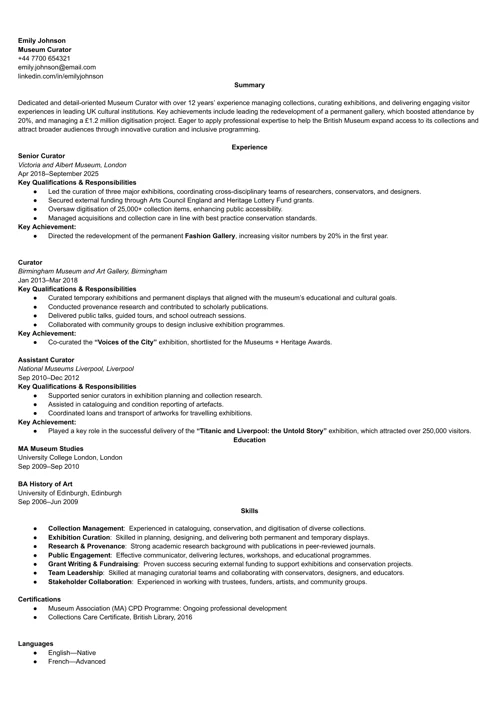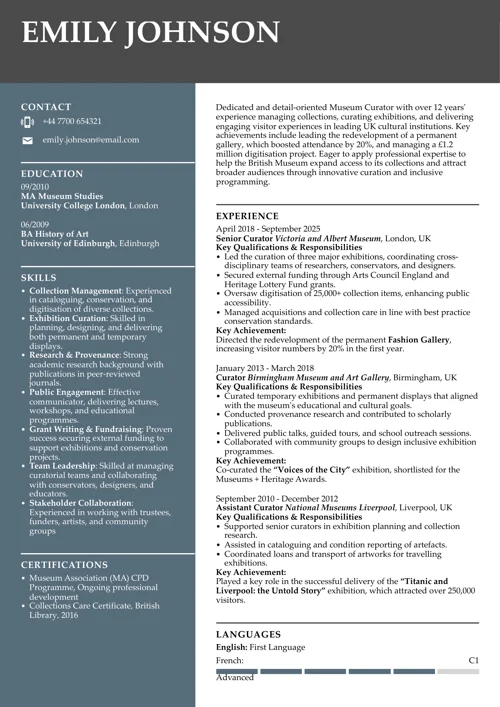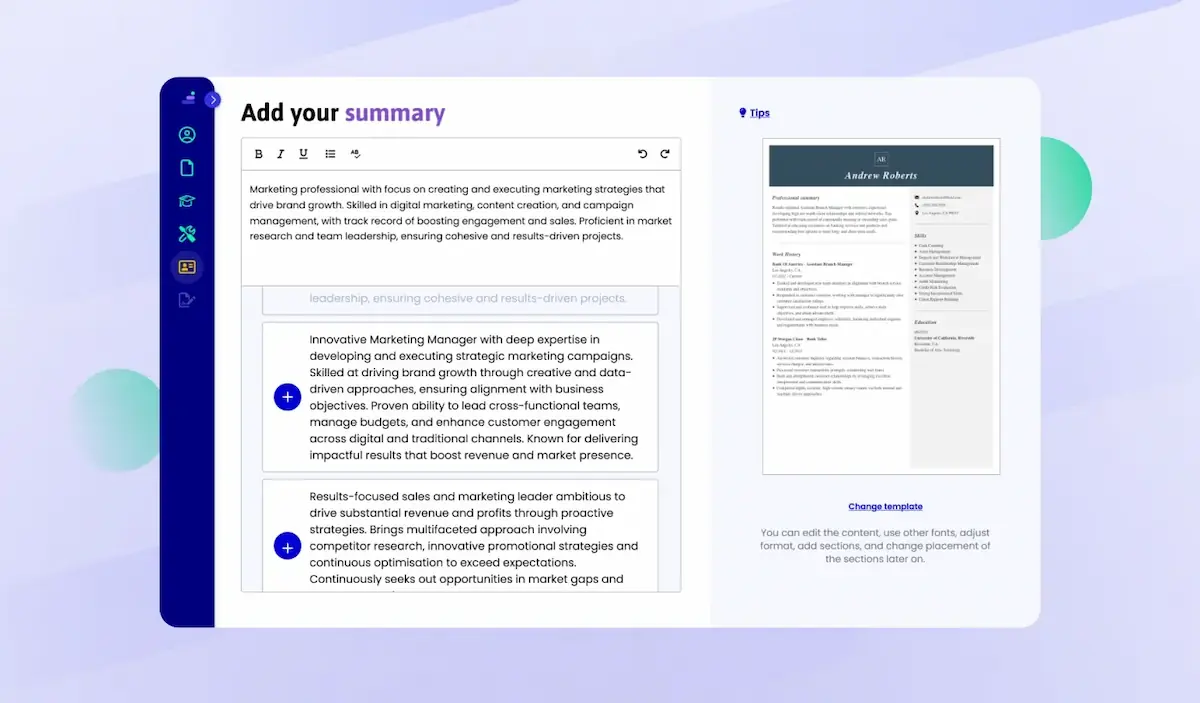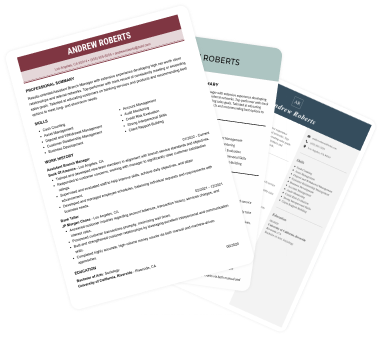Create a professional CV now!
 NO
NO YES
YESLast updated on 29 January, 2026

Our customers have been hired by*:
In a world of rapid AI advances, choosing a secure career can feel daunting. The good news is that AI is more likely to support human work than replace it. For creative thinkers, this means that uniquely human skills, such as creativity, empathy, problem-solving, and ethical judgment, are becoming more valuable.
In the UK, government and industry are investing heavily in upskilling to meet this demand. The result: exciting, future-proof career paths where imagination and human insight thrive alongside technology. Let me present the best AI-proof careers for creative thinkers.
Create an effective CV in minutes. Choose a professional CV template and fill in every section of your CV in a flash using ready-made content and expert tips.
Create a professional CV now!
 NO
NO YES
YESWe created the sample on the left using our builder. See other good CV examples like this one.
Interested in more related articles? Check these out:
Why it’s AI-resistant:
Therapy relies on trust, empathy, and creative engagement: qualities that AI can’t authentically replicate. While AI tools assist with diagnostics or records, the therapeutic alliance remains purely human. It’s estimated that around 10–30% of UK jobs are classed as “highly automatable,” yet it’s doubtful that AI could handle the personal relationships, emotional support, and creativity that art therapists provide.
UK Outlook:
Entry Routes:
Alternative career paths:
Also includes music therapy, play therapy, and drama therapy, all of which combine artistic expression with emotional support.
Why it’s AI-resistant:
UX design is human-centred problem-solving: understanding user needs, creating intuitive flows, and applying emotional insight to technology. AI can help analyse user data or generate design drafts, but humans decide what “feels right.” By 2035, an estimated 10 million Britons will use AI in their daily tasks. This means the future belongs not just to coders, but to people who can pair technical tools with uniquely human abilities.
UK Outlook:
Entry Routes:
Alternative career paths:
Also includes motion graphics artists, digital illustrators, and game UX specialists—roles that blend aesthetics, storytelling, and technical skills.
Why it’s AI-resistant:
Education is about people skills such as mentoring, motivation, and adaptability. AI can mark tests or suggest lesson plans, but human educators inspire and tailor learning to meet individual needs.
UK Outlook:
Entry Routes:
Alternative career paths:
Also includes corporate trainers, curriculum developers, and learning experience designers, all of whom require creative communication and effective learner engagement.
Why it’s AI-resistant:
Strategy, persuasion, and organisational insight are human strengths. AI provides analysis; consultants provide context, creativity, and influence.
UK Outlook:
Entry Routes:
Alternative career paths:
Also includes brand strategists, change managers, and sustainability consultants.
Why it’s AI-resistant:
Curators interpret culture, shape narratives, and create experiences that connect audiences to their heritage, a profoundly human endeavour.
UK Outlook:
Entry Routes:
Alternative career paths:
Exhibition designers, public programme coordinators, heritage interpreters: all combining storytelling with design.
A strong CV summary will convince the recruiter you’re the perfect candidate. Save time and choose a ready-made personal statement written by career experts and adjust it to your needs in the LiveCareer CV builder.

Why it’s AI-resistant:
Sustainable design integrates creativity, technical know-how, and ethical/environmental judgment. AI can’t balance human and ecological priorities.
UK Outlook:
Entry Routes:
Alternative career paths:
Landscape architects, eco-product designers, and environmental brand communicators.
Why it’s AI-resistant:
Emotional resonance, brand authenticity, and cultural nuance require human judgment, even when AI assists with the drafting process.
UK Outlook:
Entry Routes:
Alternative career paths:
Podcast producers, documentary filmmakers, and brand narrative consultants.
Why it’s AI-resistant:
Algorithms can’t replicate unique craftsmanship and tactile skill. Bespoke products have cultural and emotional value.
UK Outlook:
Entry Routes:
Alternative career paths:
Furniture makers, jewellery designers, and restoration specialists.
Why it’s AI-resistant:
Directing live performance involves human connection, timing, and physical presence, which are elements AI can’t reproduce.
UK Outlook:
Entry Routes:
Alternative career paths:
Choreographers, set designers, experience designers: roles where creativity meets audience interaction.
Why it’s AI-resistant:
Shaping policy and services for people’s needs involves empathy, stakeholder engagement, and balancing competing values, as AI can’t lead to consensus.
UK Outlook:
Entry Routes:
Alternative career paths:
Community programme leads, public innovation managers, NGO design strategists.
The age of AI is not the end of creative careers—it’s a call to action for creative thinkers to amplify what makes them human. The UK’s labour market is evolving, but it’s doing so with clear signals: roles that blend human creativity, empathy, and ethics with new technology are on the rise.
Whether you’re drawn to healing through art, designing user-friendly tech, inspiring minds in a classroom, or crafting business strategies, there’s a place for you in the future economy. By choosing a path that excites your creative spirit and committing to lifelong learning, you can build a career that is not only AI-resistant but truly rewarding.
The future of work in the UK will be driven by those who imagine, empathise, and create; in other words, by you. So equip yourself, stay curious, and step confidently into that future. After all, while AI might be a powerful tool, the world still needs what only human creativity can provide.
Looking for more career advice? See these articles:
You don’t have to be a CV writing expert. In the LiveCareer CV builder you’ll find ready-made content for every industry and position, which you can then add with a single click.

Thank you for reading my article about 10 AI-resistant career paths for creative thinkers. If you’re looking for more actionable career advice, head over to our blog for more inspiring articles.
Our editorial team has reviewed this article for compliance with LiveCareer’s editorial guidelines. It’s to ensure that our expert advice and recommendations are consistent across all our career guides and align with current CV and cover letter writing standards and trends. We’re trusted by over 10 million job seekers, supporting them on their way to finding their dream job. Each article is preceded by research and scrutiny to ensure our content responds to current market trends and demand.
Category: Career Advice
Crafting a job-winning CV is all about showcasing your unique skills and experiences. Start with a strong personal statement that highlights your career goals and achievements.
Try Our CV Builder Now